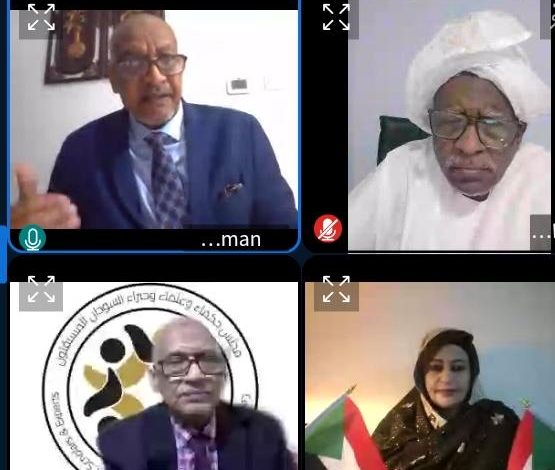Economic
Adopted by the Council of Wise Men: Sudan’s Vision for 2040 – Challenges in Implementation

Sudan Events – Rehab Abdullah
Strategic expert Professor Mohamed Hussein Suleiman Abousalih confirmed that the strategy, which presents Sudan’s vision for the year 2040, if implemented, will position Sudan similarly to Brazil within 15 years. He added that this poses a significant challenge for scientists and experts in transforming this vision and strategy into reality.
Professor Mohamed Hussein Abousalih emphasized the importance of calling for a comprehensive national dialogue to reinforce the significance of uniting the national front and overcoming political disputes through purposeful dialogue that includes all Sudanese parties.
Roadmap
During the first press conference on Tuesday for the Council of Independent Sudanese Scholars, Experts, and Wise Men, Abousalih called for showcasing the role of “wise men and experts” as effective mediators in bridging viewpoints and establishing a roadmap based on scientific expertise to resolve economic crises, such as inflation, the decline in agricultural and industrial production, and the collapse of infrastructure. He also suggested presenting practical studies for sustainable development projects.
Abousalih stressed the importance of supporting political reform and governance, enhancing good governance, transparency, and institutionalization. He proposed clear mechanisms to achieve good governance, including fighting corruption, focusing on building institutions, and activating the role of civil society and the private sector through genuine partnerships between the government, private sector, and civil society organizations to achieve economic and social development. He also highlighted the importance of encouraging both local and foreign investments, relying on a stable and attractive economic environment.
Role of Youth
Abousalih emphasized the role of youth and technology, calling for the integration of youth into development processes and making use of their capabilities. He suggested initiatives to utilize technology and artificial intelligence in education, agriculture, and industry, while promoting technological innovation.
Abousalih clarified that the potential recommendations include establishing specialized technical committees to provide urgent solutions for vital economic sectors, proposing national projects such as renewable energy projects and land reclamation, activating monitoring mechanisms for policy implementation to ensure that recommendations turn into practical programs, and strengthening regional and international cooperation to achieve logistical and technical support for Sudan. He also advocated for prioritizing programs to rehabilitate youth and human resources for sustainable development.
Challenges
Abousalih acknowledged that there are challenges facing the outcomes and implementation of the vision, attributing these to the current economic and security situation, as well as the multiplicity of conflicting parties, which may complicate achieving comprehensive consensus. He noted that limited resources pose a challenge in securing necessary funding for the proposed projects.
Solutions
However, Abousalih firmly believed that solving the obstacles lies in the strategy presented by the Council of Wise Men, adding that the press conference by the Council of Independent Sudanese Scholars, Experts, and Wise Men is a significant step toward finding scientific and sustainable solutions to current crises, provided that there is political and popular will to implement these outcomes.
Responsibility of the Council of Wise Men
The attendees of the press conference praised it, considering it timely as Sudan faces significant challenges on the political, economic, and social fronts. They believed that the roles of the wise men, scholars, and experts lie at the heart of potential solutions for managing current and future crises.
For his part, expert Dr. Mohamed Abdel Qader Abou Qusisa presented a vision for the Council of Independent Sudanese Scholars, Experts, and Wise Men, highlighting their significant role in this vision and strategy. He mentioned that this vision had reached the Sovereign Council’s table and discussed Sudan’s heritage and values. He stated, “A country with such value deserves strength,” and urged the people of Sudan to be informed about the Vision for Sudan 2040 and involve everyone in it, emphasizing that no one should be excluded, and all are equal in this national project initiated by the council.
Engineer Saad Babiker El-Daw, supervisor of the Sudanese Scholars and Experts Platform, provided a media briefing on the Council of Independent Sudanese Scholars, Experts, and Wise Men. He explained that the council consists of 150 Sudanese scholars, experts, and wise men and was established to support the Vision and Strategy for Sudan 2040 by Professor Mohamed Hussein Suleiman Abousalih, led by loyal Sudanese nationals who are experts in their fields.
He added, “We have worked for almost two months to assemble this carefully selected group, renowned for their accumulated experience and known contributions, to support Professor Abousalih’s Vision and Strategy for Sudan 2040.” He also revealed that the official letter to the Sovereign Council was prepared on behalf of the Council of Independent Sudanese Scholars, Experts, and Wise Men, after modifications were made, and the complete file was submitted for the Sovereign Council’s review.
He explained that the seven sectors presented by Professor Abousalih are specialized sectors and part of the comprehensive strategy for dialogue and discussion, and these groups could become the nucleus for a legislative council that will oversee the upcoming transitional period after expanding its scope and granting it an official status.



